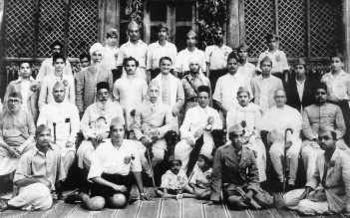- Akhil Bharatiya Hindu Mahasabha
-
The Akhil Bhārat Hindū Mahāsabhā (Hindi: अखिल भारत हिन्दू महासभा, English: All-Indian Hindu Assembly) is a Hindu nationalist political party in India. It was founded in 1915, as an alternative for Hindus who were not attracted to the secular Indian National Congress and sought to oppose the Muslim separatism of the Muslim League.
Hindutva
The Mahasabha promoted the principles of Hindutva, a Hindu nationalist ideology developed by its pre-eminent leader Vinayak Damodar Savarkar.the Mahasabha identified India as "Hindu Rashtra" (Hindu Nation). Although it broadly supported the Indian National Congress in its efforts to attain national independence, it criticised the Congress commitment to non-violence, civil disobedience, secularism and its efforts to integrate Muslims and hold dialogue with the separatist Muslim League party, which the Mahasabha deemed to be appeasement.
History
Although it remained a relatively small political party, the Mahasabha's members at various times included pre-eminent Indian political leaders such as Madan Mohan Malaviya, founder of the Benaras Hindu University; Dr. K. B. Hedgewar, founder of the Rashtriya Swayamsevak Sangh (RSS) and the former chief minister of the Central Provinces and Berar; Syama Prasad Mookerjee of Bengal, who served as Central Minister in Nehru's cabinet; and Narayan Bhaskar Khare, who served as the Mahasabha's president from 1949 to 1951. The Mahasabha's influence was hindered by its opposition to the widely-popular civil disobedience campaigns led by the Congress Party to achieve Indian independence from British rule. The restrictions imposed by the British authorities on the political activities of its leader Vinayak Damodar Savarkar also impaired its development.
Due to the rise of the Muslim League's campaign for a separate Muslim state of Pakistan and growing acrimony between Hindus and Muslims, the Mahasabha increasingly became home to radical Hindu activists. With the partition of India and the creation of Pakistan in 1947, Savarkar and the Mahasabha laid blame on the Congress leaders, especially Mahatma Gandhi, for appeasing the Muslims and making too many concessions it considered detrimental to Hindu interests.
On January 30, 1948, Gandhi was assassinated by Nathuram Godse. Subsequent police investigations revealed that Godse and his confederates were members of the Hindu Mahasabha, and close confidants of Savarkar. Although Savarkar himself was acquitted of involvement by the courts, the conviction of the rest led to a major popular backlash against the Hindu Mahasabha.
A good number of Hindu Mahasabhaites joined the Bharatiya Jana Sangh, founded in 1951 under the leadership of Syama Prasad Mookerjee, who had joined with the RSS. Mookerjee had left Mahasabha after his proposal to allow Muslims to gain membership was turned down by Savarkar. In 1980, the BJS transformed into the Bharatiya Janata Party (BJP), which is today India's largest party aside from the Congress.
The Hindu Mahasabha continued to survive on the fringes of Indian politics. Bishan Chandra Seth of Shahjahanpur was elected twice to the Indian Parliament from Etah and was one of the longest serving parliamentarians from Hindu Mahasabha. Another long-serving parliamentarian from Sabha was Mahant Avaindnath.
Categories:- Political parties in India
- Hindu political parties
Wikimedia Foundation. 2010.


